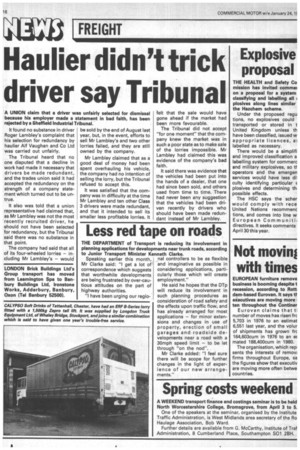Haulier didn't trick driver say Tribunal
Page 18

If you've noticed an error in this article please click here to report it so we can fix it.
A UNION claim that a driver was unfairly selected for dismissal because his employer made a statement in bad faith, has been rejected by a Sheffield Industrial Tribunal.
It found no substance in driver Roger Lambley's complaint that his selection for redundancy by haulier Alf Vaughan and Co Ltd was carried out unfairly.
The Tribunal heard that no one disputed that a decline in work had made it necessary that drivers be made redundant, and the trades union said it had accepted the redundancy on the strength of a company statement which turned out to be untrue.
It also was told that a union representative had claimed that, as Mr Lambley was not the most recently recruited driver, he should not have been selected for redundancy, but the Tribunal said there was no substance in that point.
The company had said that all of its four-wheeled lorries — including Mr Lambley's — would be sold by the end of August last year, but, in the event, efforts to sell Mr Lambley's and two other lorries failed, and they are still owned by the company.
Mr Lambley claimed that as a good deal of money had been spent overhauling his vehicle, the company had no intention of selling the lorry, but the Tribunal refused to accept this.
It was satisfied that the company was in difficulty at the time Mr Lambley and ten other Class 3 drivers were made redundant, and that it intended to sell its smaller less profitable lorries. It felt that the sale would have gone ahead if the market had been more favourable.
The Tribunal did not accept "for one moment" that the company knew the market was in such a poor state as to make sale of the lorries impossible. Mr Lambley had claimed this was evidence of the company's bad faith.
It said there was evidence that the vehicles had been put into the hands of a dealer, that one had since been sold, and others used from time to time. There had never been any suggestion that the vehicles had been driven recently by drivers who should have been made redundant instead of Mr Lambley.








































































































